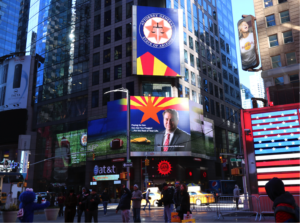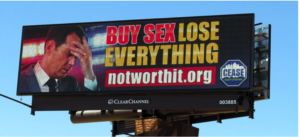-by Angelyn Bayless
The giant image of a forlorn man wearing a gold wedding ring might surprise you as you drive along the highways and busy streets of Phoenix, AZ. The bright, lit-up billboard reads, “Buy Sex, Lose Everything.”
In an effort to end sex trafficking and commercial sexual exploitation, Arizona is leading the nation in creative ways to message directly to sex buyers. New trends in addressing sexual exploitation by focusing on the demand side of the problem are gaining momentum in many cities, but no place quite as strong as in Phoenix, Arizona.
Buyers are the engine that fuels the sexual exploitation market by providing revenue that attracts pimps and traffickers because of huge profits to be made by exploiting vulnerable individuals into the sex trade. In my city, we understand this cycle and we don’t tolerate sex buying.
Elected officials, law enforcement and community leaders have all declared a zero tolerance policy for sex buying. Men who get arrested will go to jail. They will have their car towed and likely lose their job. The City of Phoenix even has a workplace policy in place for all city employees where sexual exploitation, including sex buying, viewing online pornography and visiting sexually oriented businesses is prohibited using work property or during work hours.
The “Not Worth It” campaign messaging is designed to reach men with words and images that really matter to them—such as losing their family, job, or getting listed on a sex offender registry. The goal is for sex buyers to think twice and know that if they buy sex, they could lose everything. It’s simply NOT WORTH IT.
The campaign is also changing people’s opinions about prostitution—that it is not a  victimless crime and that prostitution causes sex trafficking, something that everyone is against. The messaging was developed based on insights collected from reformed sex buyers about what concepts would be most likely to influence a sex buyer to stop buying. What we learned through this process is that messages about the harm to victims were less effective than directly reminding the buyer of the negative impact it could have on their own life.
victimless crime and that prostitution causes sex trafficking, something that everyone is against. The messaging was developed based on insights collected from reformed sex buyers about what concepts would be most likely to influence a sex buyer to stop buying. What we learned through this process is that messages about the harm to victims were less effective than directly reminding the buyer of the negative impact it could have on their own life.
This month, timed around the National Championship football game held in Glendale, Arizona, our Attorney General, Mark Brnovich can be seen from billboards in Time Square, NYC with another strong message to sex buyers from all over the world, packaged neatly with the sports theme, “If you pay for sex, you could get flagged for life.”
With repeat messages coming from outdoor media, social media, news media, TV shows, churches, and targeted education to young people, our hope is that everyone will begin to see prostitution for what it really is—a terrible form of exploitation where both sides are victims.
In Arizona, elected officials, law enforcement, researchers, service providers, and community groups all work together to demonstrate the effectiveness of a multifaceted strategy to combat sex trafficking and commercial sexual exploitation, one that includes a strong focus on reducing demand.
We know that the vast majority of those being bought would leave the life if they could. Whether a vulnerable person is controlled by a pimp, or enslaved to their own economic hardship or perhaps driven by a need to feed an addiction—all prostitution is inherently harmful.
ClearChannel Outdoor generously donated over 50 digital billboards to the “Not Worth It” Campaign that direct potential sex buyers to a website www.notworthit.org that details all the consequences of paying for sex. The billboards reach millions of people as they drive along the highways to and from work and their daily lives.
At the bottom right hand corner of the billboards there is logo for the CEASE Network. CEASE stands for Cities Empowered Against Sexual Exploitation. The CEASE initiative is incubating a lot of creative strategies to reduce sex buying in major cities.
The Phoenix Metro area is one of eleven pioneering cities in the network committed to reducing demand for prostitution on a local level. Teams in Atlanta, Boston, Chicago (Cook County, IL), Dallas (North Texas), Denver, Houston, Oakland (Alameda County, CA), Phoenix (Metro Phoenix) Portland (Multnomah County, OR), San Diego, and Seattle (King County, WA) are all dedicated to innovating, testing, and sharing strategies with a proven impact of deterring people from buying sex and perpetuating a harmful industry.
The CEASE Network embraces a holistic approach to reducing demand, looking at solutions to prevent people from becoming buyers in the first place, stopping buyers from continuing to pay for sex, and working with local law enforcement to hold them accountable if they do.
 Researchers from the ASU Office of Sex Trafficking Intervention Research estimate that as many as ten thousand men in Phoenix look at online sex ads each day. Some of these men are just shoppers, but others pay for sex in brothels, erotic massage parlors, hotels and on the street. Researchers estimate that one in 20 men in Phoenix search online sex ads, looking to pay for sex, and that translates to nearly 80,000 men who can benefit from the “NOT WORTH IT” campaign.
Researchers from the ASU Office of Sex Trafficking Intervention Research estimate that as many as ten thousand men in Phoenix look at online sex ads each day. Some of these men are just shoppers, but others pay for sex in brothels, erotic massage parlors, hotels and on the street. Researchers estimate that one in 20 men in Phoenix search online sex ads, looking to pay for sex, and that translates to nearly 80,000 men who can benefit from the “NOT WORTH IT” campaign.
The billboard messaging and “Not Worth It” campaign in Arizona is working. So far, over 5000 people have been curious enough from seeing the message on the billboards to take the next step and visit the website where they will learn all about the social, legal and physical harms of prostitution to both the buyer and prostituted person.
We also know its working because sex buyers are talking about law enforcement efforts to crack down on sex buying in Arizona. In fact, there are hundreds of website hits coming directly from people who are learning about the campaign via online chat rooms designed specifically for men to network and share information about their so called “hobby” of buying sex. Law enforcement has even reported a reduction in the number of men who are attempting to buy sex.
While some sex buyers view the act of frequent sex buying as a sport, others suffer from sex addiction. We are learning that a portion of sex buying is compulsive and the addiction comes from a place of low self-esteem and negative views of women and sexuality. Young boys are learning about sex through pornography and their sexual preferences are being imprinted at a very young age. Real sex is not like what is portrayed online, and some men will go to great lengths and pay a lot of money for types of acts they have become attracted to—often including violence and aggression or degradation towards women.
As we begin to learn more about what drives sex buying behavior, we can address the root causes and try to teach the next generation of boys and men about gender equality, human dignity and respect. We know from other research that men who learned about mutual respect as part of sexual education are less likely to engage in sex buying.
In Arizona, we are hopeful. Public awareness about sex trafficking is at an all-time high. Prevention efforts in schools, churches and at the university level are becoming institutionalized.
Our electronic billboard messaging campaigns are literally a bright and lit-up beacon of hope to people trapped in prostitution. We stand with survivors of sex trafficking and prostitution and share their belief that human bodies are not commodities to be bought, sold, or rented by the hour.
We know prostitution and illegal commercial sexual exploitation won’t stop until there are no more buyers. Each arrest, each interaction with law enforcement, and each time a buyer reads a billboard on his way home to his wife and kids is one step closer to ending sex buying tolerance and behavior once and for all.
Angelyn Bayless is the Director of Communications for the ASU Office of Sex Trafficking Intervention Research and has co-authored multiple training brochures and presentations on the topic of sex trafficking. She also serves as the local coordinator in the Phoenix Metro area for the CEASE Initiative (Cities Empowered Against Sexual Exploitation) and coaches other network cities in their efforts to reduce demand for commercial sex.

